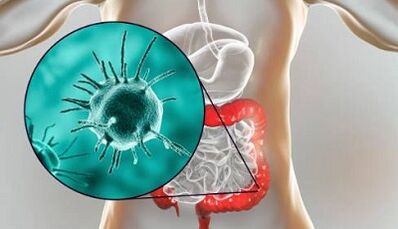
Parasitic diseases are a large group of diseases that cause helminths, some arthropods and protozoes.
Despite all the success of modern medicine and all the success of the developed hygiene, about 90% of people in the world face these pathologies in their lives at least once.What tests, you can learn how to doubt the disease and pass the parasites.
Types of parasites
Parasites are called the living organisms surviving for vital activities of living beings.In the human body, the deficiency of trace elements, vitamins, proteins and other nutrients in the process of settling, growth and reproductive process.Both can cause recurrence and complications of chronic pathologies and can damage the internal organs.
People have the following types of parasites that can cause disease:
- Protoozo (Amoebas, Lamble);
- pathogenic microorganisms (chlamidia, mycoplasmas and others);
- Helminths (Ascarids, pinworms, bull and pork chain etc.);
- Parasitic Arthropods (itching, Demodex).
The main feature of their pathologies created is a long-term asymptomatic or low-insimpomic course.Parasites hide their existence and hide their existence until the reserves are exhausted, and "to tighten the owner."
Symptoms of parasitic diseases
Parasitic pathologies are most Helminthiasis - means diseases resulting in the fact that the worms in the body.In most cases, children are found, but they can develop in adults when the rules of hygiene are neglected.After infection, they have not induced themselves in any way or are often accompanied by non-careless symptoms.

Each disease is characterized by certain features, but there are general signs:
- Headache, dizziness, increased weakness and fatigue.These manifestations are the result of the interoxie that occurred due to poisoning with parasite life.
- Bronchial asthma and allergic rhinitis, dermatitis, aggromery.Helmint creates cells and because of increasing sensitivity for their release.
- Violation of the digestive system (abdominal pain, nausea, vomiting, heartburn, constipation and diarrhea).Parasitiation in the intestinal lumen causes inflammation due to the blockage of intestinal lumen, causing the intestine.
- Anemia, vitamin deficiency, weight loss loss.The shortcomings, protein, vitamins and trace elements occur due to the reduction in the production of hormone.
- Sleep disorder, chronic fatigue, nervousness, annoyance, muscles and joint pain.
Most of them need to analyze feces to reveal the type of helminths or donate blood for special antibodies.In a clinic where there is any of the residence, as well as in any of the private laboratories, you can take a study at a clinic.Some medical centers offer expanded examination, and during this period it is possible to diagnose the presence or absence of several types of parasites in the body.
Tests for parasites

If you suspect the parasitic disease based on the participating doctor, complaints, medical history and clinical manifestations of the disease, which tests will say which tests needed.
Diagnosis begins with a general blood test.The most characteristic changes in Helminthiasis:
- The hemoglobin level has decreased and reduced the number of red blood cells (occurs due to protein and iron shortages).
- The increase in the number of leukocytes, acceleration of ESR (signs of inflammation of the internal organs, especially the gastrointestinal tract).
- Increased eosinophils (a characteristic sign of an allergy in response to irritating effects of Helmint waste products).
For a more accurate diagnosis, helmin is used in stool analysis for eggs and scraps.While researching the feces, you can discover the pathogens of Enterobiasis, Assariasis, Hymenolipedosis, and also reveal the presence of Protozoan microorganisms (Gididia).
It is important to forget that with a test, the probability of detecting the worm eggs in feces is 30%.Therefore, to clarify the diagnosis, with the first negative result, the research is carried out twice twice with a range of 2-4 days.
It is important to carefully prepare for a stool to analyze the accuracy of the study.Biological material should be collected in a special sterile container purchased in a pharmacy.A few days before the test, you need to stop eating foods (beets, red berries, exotic fruits, sweets) and do not use laxatives or rectal spools.
Immune analysis
Using Elisa's analysis in adults and children, the human body can be found in response to the external objects in the inside of the antibodies.To do this, you can discover custom IGG antibodies in a laboratory, a laboratory, a laboratory, Giardia, Trichomonads, Pig and Bull Tapeworm, Txinellah, Echinococcus, Tokcaris and Pinworms.With the help of this study, there can be almost all parasites in the human body.
Preparation for the study is not difficult.In the morning, it is necessary to analyze an empty stomach after 8-10 hours of hunger.On the eve of research, it is recommended not to receive antibacterial and antihistinesians, as well as allergens (points, seafood, exotic fruits and red berries, nuts).Prior to the blood donation, experts recommend the lab to rest 10-15 minutes in the waiting room.
The results of the study are known in 1-2 days.These studies are carried out as both initial diagnosis, as well as control treatment.
The modern effective treatment of modern detection and modern effective parasitic diseases prevents dangerous complications for health.



























